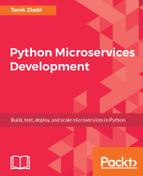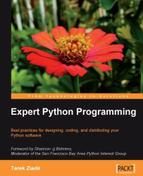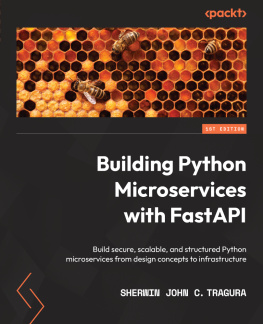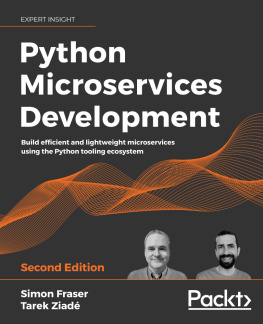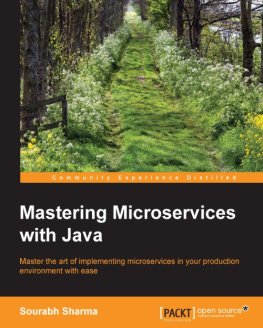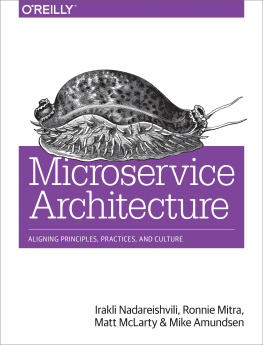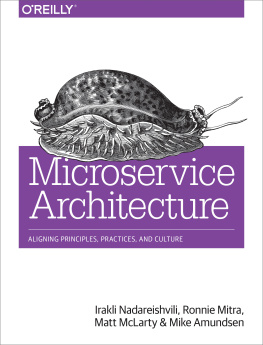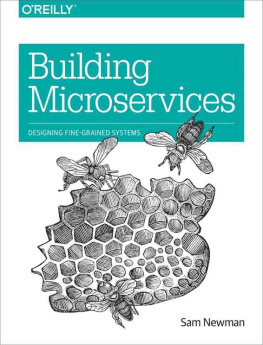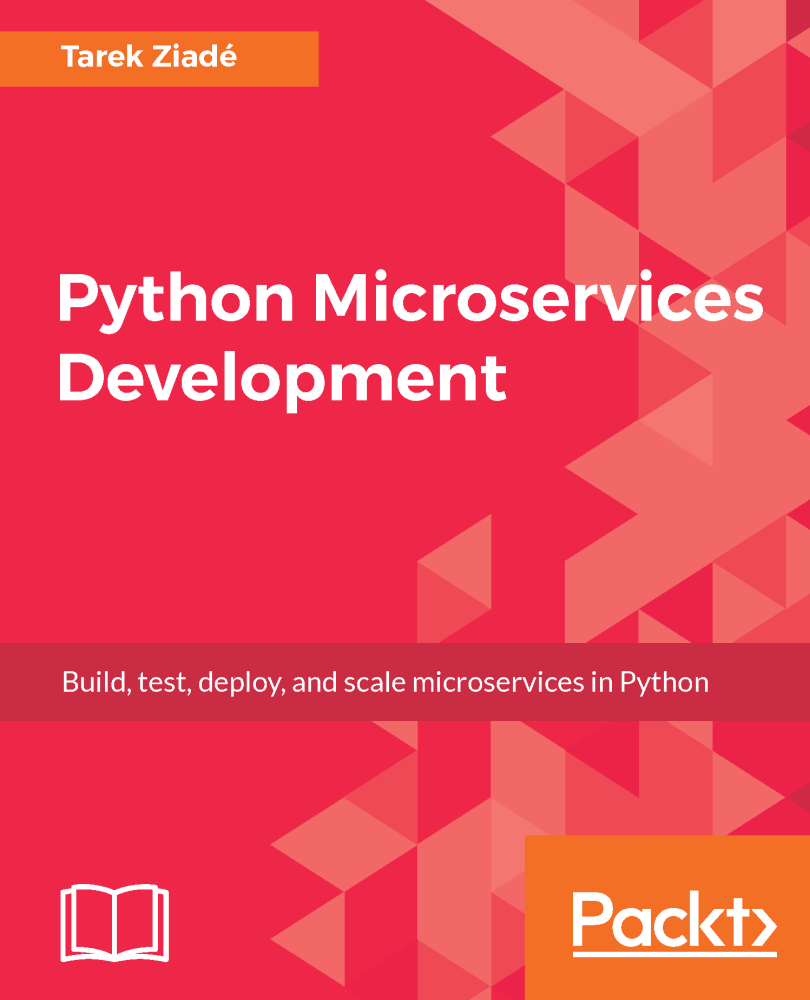Tarek Ziadé - Python Microservices Development
Here you can read online Tarek Ziadé - Python Microservices Development full text of the book (entire story) in english for free. Download pdf and epub, get meaning, cover and reviews about this ebook. year: 2017, publisher: Packt Publishing, genre: Computer. Description of the work, (preface) as well as reviews are available. Best literature library LitArk.com created for fans of good reading and offers a wide selection of genres:
Romance novel
Science fiction
Adventure
Detective
Science
History
Home and family
Prose
Art
Politics
Computer
Non-fiction
Religion
Business
Children
Humor
Choose a favorite category and find really read worthwhile books. Enjoy immersion in the world of imagination, feel the emotions of the characters or learn something new for yourself, make an fascinating discovery.
- Book:Python Microservices Development
- Author:
- Publisher:Packt Publishing
- Genre:
- Year:2017
- Rating:3 / 5
- Favourites:Add to favourites
- Your mark:
Python Microservices Development: summary, description and annotation
We offer to read an annotation, description, summary or preface (depends on what the author of the book "Python Microservices Development" wrote himself). If you haven't found the necessary information about the book — write in the comments, we will try to find it.
Using Session in a Flask app -- Connection pooling -- HTTP cache headers -- Improving data transfer -- GZIP compression -- Binary payloads -- Putting it together -- Asynchronous calls -- Task queues -- Topic queues -- Publish/subscribe -- RPC over AMQP -- Putting it together -- Testing -- Mocking synchronous calls -- Mocking asynchronous calls -- Mocking Celery -- Mocking other asynchronous calls -- Summary -- Chapter 6: Monitoring Your Services -- Centralizing logs -- Setting up Graylog -- Sending logs to Graylog -- Adding extra fields -- Performance metrics -- System metrics -- Code metrics -- Web server metrics -- Summary -- Chapter 7: Securing Your Services -- The OAuth2 protocol -- Token-based authentication -- The JWT standard -- PyJWT -- X.509 certificate-based authentication -- The TokenDealer microservice -- The POST/oauth/token implementation -- Using TokenDealer -- Web application firewall -- OpenResty - Lua and nginx -- Rate and concurrency limiting -- Other OpenResty features -- Securing your code -- Asserting incoming data -- Limiting your application scope -- Using Bandit linter -- Summary -- Chapter 8: Bringing It All Together -- Building a ReactJS dashboard -- The JSX syntax -- React components -- ReactJS and Flask -- Using Bower, npm, and Babel -- Cross-origin resource sharing -- Authentication and authorization -- Interacting with Data Service -- Getting the Strava token -- JavaScript authentication -- Summary -- Chapter 9: Packaging and Running Runnerly -- The packaging toolchain -- A few definitions -- Packaging -- The setup.py file -- The requirements.txt file -- The MANIFEST.in file -- Versioning -- Releasing -- Distributing -- Running all microservices -- Process management -- Summary -- Chapter 10: Containerized Services -- What is Docker? -- Docker 101 -- Running Flask in Docker
The full stack - OpenResty, Circus and Flask -- OpenResty -- Circus -- Docker-based deployments -- Docker Compose -- Introduction to Clustering and Provisioning -- Summary -- Chapter 11: Deploying on AWS -- AWS overview -- Routing - Route53, ELB, and AutoScaling -- Execution - EC2 and Lambda -- Storage - EBS, S3, RDS, ElasticCache, and CloudFront -- Messaging - SES, SQS, and SNS -- Simple Email Service (SES) -- Simple Queue Service (SQS) -- Simple Notification Service (SNS) -- Provisioning and deployment - CloudFormation and ECS -- Deploying on AWS - the basics -- Setting up your AWS account -- Deploying on EC2 with CoreOS -- Deploying with ECS -- Route53 -- Summary -- Chapter 12: What Next? -- Iterators and generators -- Coroutines -- The asyncio library -- The aiohttp framework -- Sanic -- Asynchronous versus synchronous -- Summary -- Index Read more...
Abstract: Cover -- Copyright -- Credits -- About the Author -- About the Reviewer -- www.PacktPub.com -- Customer Feedback -- Table of Contents -- Preface -- Introduction -- Chapter 1: Understanding Microservices -- Origins of Service-Oriented Architecture -- The monolithic approach -- The microservice approach -- Microservice benefits -- Separation of concerns -- Smaller projects -- Scaling and deployment -- Microservices pitfalls -- Illogical splitting -- More network interactions -- Data storing and sharing -- Compatibility issues -- Testing -- Implementing microservices with Python -- The WSGI standard -- Greenlet and Gevent -- Twisted and Tornado -- asyncio -- Language performances -- Summary -- Chapter 2: Discovering Flask -- Which Python? -- How Flask handles requests -- Routing -- Variables and converters -- The url_for function -- Request -- Response -- Flask built-in features -- The session object -- Globals -- Signals -- Extensions and middlewares -- Templates -- Configuration -- Blueprints -- Error handling and debugging -- Custom error handler -- The debug mode -- A microservice skeleton -- Summary -- Chapter 3: Coding, Testing, and Documenting - the Virtuous Cycle -- Different kinds of tests -- Unit tests -- Functional tests -- Integration tests -- Load tests -- End-to-end tests -- Using WebTest -- Using pytest and Tox -- Developer documentation -- Continuous Integration -- Travis-CI -- ReadTheDocs -- Coveralls -- Summary -- Chapter 4: Designing Runnerly -- The Runnerly application -- User stories -- Monolithic design -- Model -- View and Template -- Background tasks -- Strava token -- Authentication and authorization -- Putting together the monolithic design -- Splitting the monolith -- Data Service -- Using Open API 2.0 -- More splitting -- Summary -- Chapter 5: Interacting with Other Services -- Synchronous calls
Using Session in a Flask app -- Connection pooling -- HTTP cache headers -- Improving data transfer -- GZIP compression -- Binary payloads -- Putting it together -- Asynchronous calls -- Task queues -- Topic queues -- Publish/subscribe -- RPC over AMQP -- Putting it together -- Testing -- Mocking synchronous calls -- Mocking asynchronous calls -- Mocking Celery -- Mocking other asynchronous calls -- Summary -- Chapter 6: Monitoring Your Services -- Centralizing logs -- Setting up Graylog -- Sending logs to Graylog -- Adding extra fields -- Performance metrics -- System metrics -- Code metrics -- Web server metrics -- Summary -- Chapter 7: Securing Your Services -- The OAuth2 protocol -- Token-based authentication -- The JWT standard -- PyJWT -- X.509 certificate-based authentication -- The TokenDealer microservice -- The POST/oauth/token implementation -- Using TokenDealer -- Web application firewall -- OpenResty - Lua and nginx -- Rate and concurrency limiting -- Other OpenResty features -- Securing your code -- Asserting incoming data -- Limiting your application scope -- Using Bandit linter -- Summary -- Chapter 8: Bringing It All Together -- Building a ReactJS dashboard -- The JSX syntax -- React components -- ReactJS and Flask -- Using Bower, npm, and Babel -- Cross-origin resource sharing -- Authentication and authorization -- Interacting with Data Service -- Getting the Strava token -- JavaScript authentication -- Summary -- Chapter 9: Packaging and Running Runnerly -- The packaging toolchain -- A few definitions -- Packaging -- The setup.py file -- The requirements.txt file -- The MANIFEST.in file -- Versioning -- Releasing -- Distributing -- Running all microservices -- Process management -- Summary -- Chapter 10: Containerized Services -- What is Docker? -- Docker 101 -- Running Flask in Docker
The full stack - OpenResty, Circus and Flask -- OpenResty -- Circus -- Docker-based deployments -- Docker Compose -- Introduction to Clustering and Provisioning -- Summary -- Chapter 11: Deploying on AWS -- AWS overview -- Routing - Route53, ELB, and AutoScaling -- Execution - EC2 and Lambda -- Storage - EBS, S3, RDS, ElasticCache, and CloudFront -- Messaging - SES, SQS, and SNS -- Simple Email Service (SES) -- Simple Queue Service (SQS) -- Simple Notification Service (SNS) -- Provisioning and deployment - CloudFormation and ECS -- Deploying on AWS - the basics -- Setting up your AWS account -- Deploying on EC2 with CoreOS -- Deploying with ECS -- Route53 -- Summary -- Chapter 12: What Next? -- Iterators and generators -- Coroutines -- The asyncio library -- The aiohttp framework -- Sanic -- Asynchronous versus synchronous -- Summary -- Index
Tarek Ziadé: author's other books
Who wrote Python Microservices Development? Find out the surname, the name of the author of the book and a list of all author's works by series.

